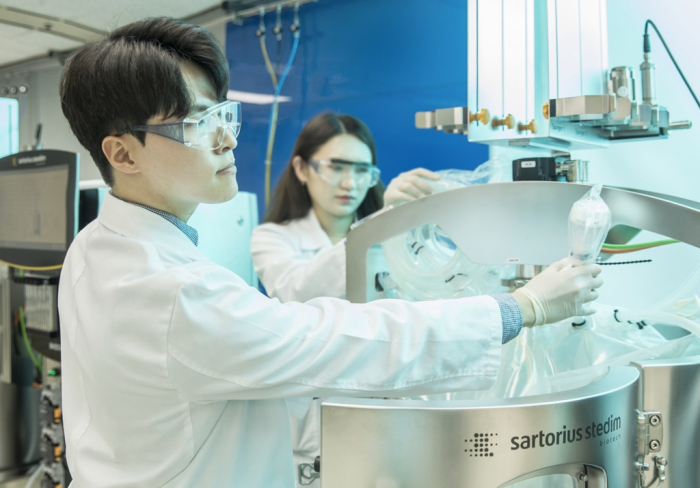Bio & Pharma
Samsung targets gene therapy sector through US investments
Samsung’s Life Science Fund decides to invest in two US gene therapy developers, including Latus Bio
By Feb 27, 2024 (Gmt+09:00)
2
Min read
Most Read
LG Chem to sell water filter business to Glenwood PE for $692 million


Kyobo Life poised to buy Japan’s SBI Group-owned savings bank


KT&G eyes overseas M&A after rejecting activist fund's offer


StockX in merger talks with Naver’s online reseller Kream


Mirae Asset to be named Korea Post’s core real estate fund operator



Samsung Group is targeting the gene therapy business through investments in US biotechnology companies as the leading South Korean conglomerate is seeking new growth engines for its medical units.
The Life Science Fund established by the group’s de facto holding company Samsung C&T Corp., Samsung Biologics Co. and Samsung Bioepis Co. have decided to invest in two US gene therapy developers, including Latus Bio, according to sources of the South Korean bio and investment industries on Tuesday. The fund was known to have already injected money into the other company, those sources said without giving details such as the firm’s name and the investment value.
Latus Bio based in Cambridge, Massachusetts, develops curative medicines for neurological diseases utilizing adeno-associated viruses (AAVs), which are used as an effective delivery system for therapeutic genetic material into living tissue.
Samsung Biologics President & CEO John Rim said the world’s top contract manufacturing organization was considering the expansion into the AAV sector in the contract drug development business at the JP Morgan Healthcare Conference 2024 in January.
GENE THERAPY
Samsung Group has reportedly decided to focus more on gene therapy than cell therapy as a next-generation growth engine as the treatment of disease by transfer of genetic material into cells is well-suited to the existing facilities and production processes, according to sources in Seoul.
Gene therapy is usually used for the treatment of rare diseases that cannot be cured by the existing antibody drugs, while its application can be extended.
AAVs are widely used as gene delivery vehicles for various medicines such as Pfizer Inc.’s Beqvez, gene therapy to treat certain adults with hemophilia B.
Global contract development and manufacturing organizations including Catalent Inc. and WuXi Biologics have already been working on the AAV CDMO business.
“Samsung is kind of lagging since other major global drugmakers have already been producing CGTs,” said a bio-industry source in Seoul, referring to cell and gene therapies. “I hope Samsung can create synergy between research and development, as well as manufacturing, through these measures.”
Write to Jeong Min Nam at peux@hankyung.com
Jongwoo Cheon edited this article.
More to Read
-
 Bio & PharmaK-bio firms embrace gene therapy CDMO as Samsung looks the other way
Bio & PharmaK-bio firms embrace gene therapy CDMO as Samsung looks the other wayAug 05, 2022 (Gmt+09:00)
3 Min read -
 Bio & PharmaSamsung’s Life Science Fund invests in US biotech Jaguar Gene Therapy
Bio & PharmaSamsung’s Life Science Fund invests in US biotech Jaguar Gene TherapyMar 30, 2022 (Gmt+09:00)
2 Min read
Comment 0
LOG IN


